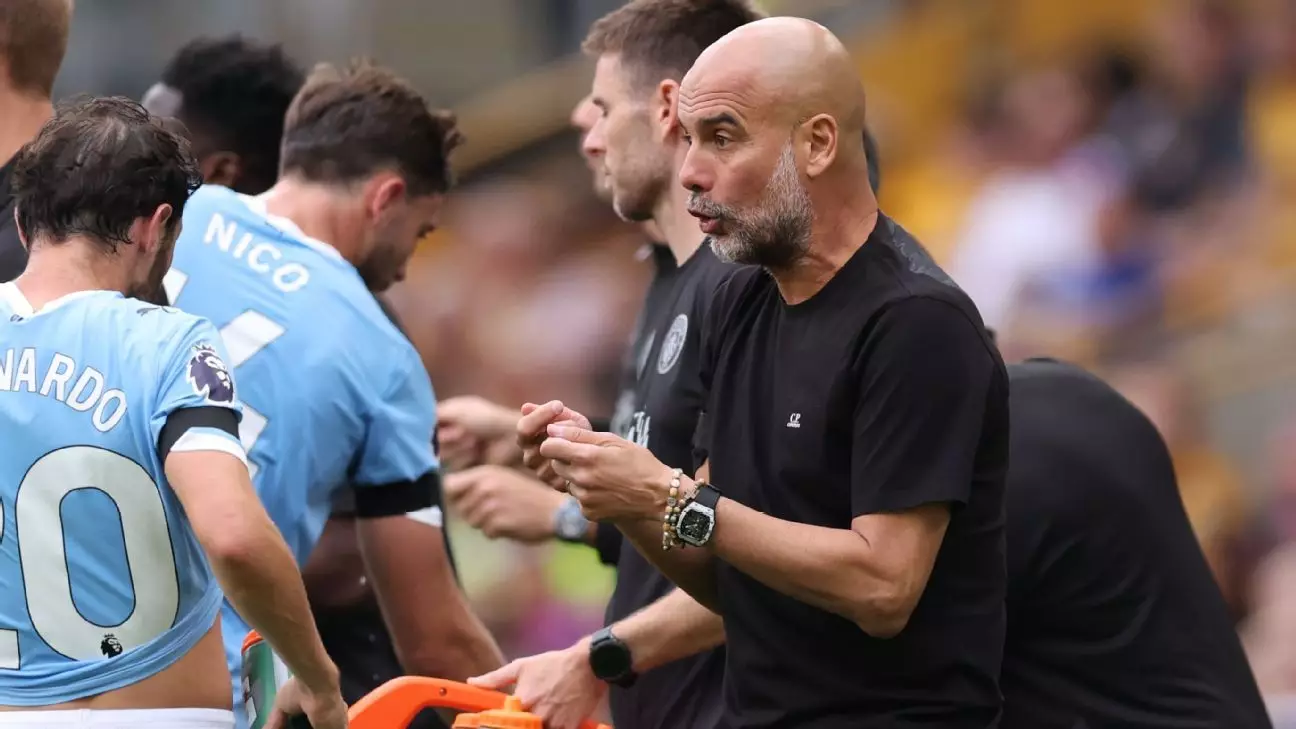Manchester City’s commanding 4-0 victory against Wolverhampton Wanderers in their Premier League opener showcased their undeniable attacking prowess and tactical sharpness. With Erling Haaland netting twice, along with goals from new signings Tijjani Reijnders and Rayan Cherki, the result reinforced City’s ambitions for another successful campaign. However, beneath this triumphant surface lies a brewing issue that could threaten the team’s long-term consistency: an excessively bloated squad.
Pep Guardiola’s candid acknowledgment that the squad size is “not healthy” underscores a fundamental challenge for elite clubs operating at the highest level. While a deep roster offers tactical flexibility and resilience across various competitions, an overly large ensemble risks diluting playing time, impacting team chemistry, and fostering an environment of dissatisfaction. Guardiola’s frustration is rooted in the delicate balance required to maintain a harmonious squad where all players feel valued and motivated.
The manager’s emphasis on reducing unnecessary squad members reflects a strategic shift. He recognizes that creating a positive competitive atmosphere is paramount, and an overstocked squad could undermine this goal. The realization that some players may have to depart within the next two weeks demonstrates a pragmatic approach to squad management—one that prioritizes quality over quantity, team cohesion over individual agendas.
Uncertainty Surrounding Key Personnel and Future Transfers
One of the most scrutinized aspects of Manchester City’s ongoing transfer considerations is the future of their goalkeeper, Ederson. Rumors suggesting his potential move to Galatasaray have circulated all summer, yet Guardiola maintains unwavering confidence in the Brazilian shot-stopper. Zeroing in on his health during the Wolves game, Guardiola revealed Ederson was sidelined due to gastroenteritis, dismissing reports tied to supposed interest from Gala.
However, the goalkeeper’s situation remains fluid. City’s links to PSG’s Gianluigi Donnarumma point to a possible future change, yet Guardiola’s statement—that Ederson is still the “number one”—indicates internal stability for now. The coach underscores that if a player wishes to leave, it must be under the club’s conditions. This stance reflects a broader reality in top-tier football: transfer rumors often are speculative, but club authority over player movement remains absolute.
The ongoing dialogue about squad personnel signals that Manchester City is actively assessing its options—both to fortify their squad for multiple challenges and to avoid future discontent. Whether it’s retaining Ederson or acquiring a new goalkeeper, the coming weeks will be crucial in shaping the team’s composition.
Strategic Realignment and Long-Term Vision
Guardiola’s comments reveal a coach keenly aware of the importance of strategic squad management. His praise for Reijnders, who impacted immediately by assisting two goals, affirms that the club is investing in long-term talent. Reijnders’ integration signifies a broader vision—building a team capable of sustained excellence, not just a quick-fix lineup for the current season.
Furthermore, Guardiola’s acknowledgment that the team can still improve suggests existing tactical refinements are on the horizon. While the first-half performance was praised, he admits that second-half lapses are normal at this stage. His goal remains to sharpen transitions, exploit their blistering pace, and enhance overall consistency. These objectives are vital if Manchester City is to defend their title and challenge in every competition.
However, the emphasis on squad trimming indicates a desire to streamline their roster, allowing players to feel secure in their roles and avoid the toxicity that can accompany prolonged competition for starting spots. This approach echoes modern football principles: a well-managed, motivated squad is more likely to deliver peak performance than one burdened by excess personnel and internal competition.
Manchester City’s opening game has clarified that while their quality remains unmatched, their internal management is just as critical as tactical preparation. Guardiola’s openness about the squad’s excess capacity signals a mature, strategic approach—one that aims to refine rather than expand blindly. Success in modern football hinges less on having the most players and more on having the right ones. As the transfer window closes, City’s ability to create a balanced, motivated, and cohesive squad could determine whether they continue their dominance or falter under the weight of their own numbers.


Leave a Reply